
UK SANCTIONS LIST DO YOU KNOW THE DIFFERENCES BETWEEN THE X3
06/11/2023
A few of our clients have expressed a bit of confusion about the
- ‘UK Sanctions List’ issued by the Foreign, Commonwealth and Development Office [FCDO] and
How this differs from
- The ‘OFSI Consolidated List of Financial Sanctions Targets issued by HMT/the Office of Financial Sanctions Implementation.
In response i hope the following helps decipher the lists
The OFSI Consolidated List, UK Sanctions List, and the UK Prescribed Terrorist Groups and Organisations List are all different types of lists maintained by the UK government, each serving a unique purpose:
- OFSI Consolidated List:
- This is a list of financial sanctions targets in the United Kingdom. It reflects all financial sanctions designations made under UK legislation, including both the Sanctions Act and the Anti-Terrorism Crime and Security Act 2001 (ATCSA).
- If you are doing business with an individual or company associated with a person on this list, you must report it to the Office of Financial Sanctions Implementation (OFSI).
- UK Sanctions List:
- This list is published by the UK government and provides details of those designated under regulations made under the Sanctions Act.
- It does not include those designated under other sources, e.g., the Anti-Terrorism Crime and Security Act 2001 (ATCSA).
- The list details which sanctions measures apply to these persons or ships, and in the case of UK designations, provides a statement of reasons for the designation - https://www.gov.uk/government/publications/the-uk-sanctions-list
- UK Prescribed Terrorist Groups and Organisations List:
- This list is maintained under the UK Terrorism Act 2000. An organization may be proscribed (“banned”) under this act if the Home Secretary believes it is involved in terrorism and it is proportionate to do so.
- This list is not included in OFSI’s consolidated list.
In summary, while all three lists serve the purpose of maintaining national security and ensuring compliance with international obligations, they differ in their scope and the specific legislation under which they operate. It’s important to understand these differences when dealing with matters related to sanctions and financial transactions.
ADDITIONAL INFORMATION
- Whilst the HMT Consolidated List has been in place for some time, the UK Sanctions List is a relatively recent addition.
- The UK Sanctions List is the comprehensive list of individuals, entities, or ships designated under sanctions regimes set up using the powers of the Sanctions and Anti Money Laundering Act (2018) (“the Sanctions Act”).
- The Sanctions Act was brought in to ensure that the UK would meet its UN-driven sanctions resolutions following its departure from the EU.
So what does this mean for UK-regulated firms?
- Should firms abandon the HMT/OFSI list and just screen against the new FCDO list?
- Does your firm know what is on each list (and what isn’t?) and what this means for your sanctions risk?
Publicly available information on this is a bit thin on the ground, so we went to the horse’s mouth and asked the FCDO directly. Here is their response:
- The UK Sanctions List is the comprehensive list of individuals, entities, or ships designated under sanctions regimes set up using the powers of the Sanctions and Anti Money Laundering Act (2018) (“the Sanctions Act”).
- The restrictions applied to such persons, entities or ships can include financial, immigration, trade, or transport sanctions.
- The UK Sanctions List only covers those designated under the Sanctions Act.
- It does not include those designated under other sources, e.g. the Anti-Terrorism Crime and Security Act 2001 (ATCSA).
- The OFSI Consolidated Lists reflect all financial sanctions designations made under UK legislation (both the Sanctions Act and ACTSA).
- But they do not include those subject to other forms of sanctions, such as immigration, trade, or transport.
- The lists consist of a consolidated list of financial sanctions for those subject to asset freezes and asset freezing orders, and a separate list for those subject to restrictions on financial markets and services.
The diagram below summarises the FCDO response:

SOURCE
https://sqa-consulting.com/uk-sanctions-lists-hmt-vs-fcdo/
The Team
Meet the team of industry experts behind Comsure
Find out moreLatest News
Keep up to date with the very latest news from Comsure
Find out moreGallery
View our latest imagery from our news and work
Find out moreContact
Think we can help you and your business? Chat to us today
Get In TouchNews Disclaimer
As well as owning and publishing Comsure's copyrighted works, Comsure wishes to use the copyright-protected works of others. To do so, Comsure is applying for exemptions in the UK copyright law. There are certain very specific situations where Comsure is permitted to do so without seeking permission from the owner. These exemptions are in the copyright sections of the Copyright, Designs and Patents Act 1988 (as amended)[www.gov.UK/government/publications/copyright-acts-and-related-laws]. Many situations allow for Comsure to apply for exemptions. These include 1] Non-commercial research and private study, 2] Criticism, review and reporting of current events, 3] the copying of works in any medium as long as the use is to illustrate a point. 4] no posting is for commercial purposes [payment]. (for a full list of exemptions, please read here www.gov.uk/guidance/exceptions-to-copyright]. Concerning the exceptions, Comsure will acknowledge the work of the source author by providing a link to the source material. Comsure claims no ownership of non-Comsure content. The non-Comsure articles posted on the Comsure website are deemed important, relevant, and newsworthy to a Comsure audience (e.g. regulated financial services and professional firms [DNFSBs]). Comsure does not wish to take any credit for the publication, and the publication can be read in full in its original form if you click the articles link that always accompanies the news item. Also, Comsure does not seek any payment for highlighting these important articles. If you want any article removed, Comsure will automatically do so on a reasonable request if you email info@comsuregroup.com.


